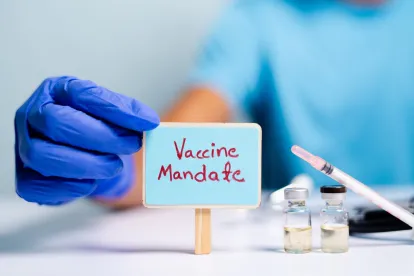The COVID-19 vaccine mandate implemented by the Centers for Medicare and Medicaid Services (CMS) has affected investor interest in non-acute care providers and suppliers, including home care providers. As our colleagues reported, CMS initially promulgated its vaccine mandate on November 5, 2021. The CMS vaccine mandate requires certain health care facilities certified by Medicare and/or Medicaid to establish COVID-19 vaccination requirements for their staff and to ensure 100% of their staff become fully vaccinated.
On January 13, 2022, the Supreme Court issued a decision lifting injunctions in 24 states that had blocked enforcement of the CMS vaccine mandate. In contrast, on the same day, the Supreme Court issued a decision blocking the employer vaccine mandate—the Emergency Temporary Standard issued by the Occupational Safety and Health Administration—from taking effect.
On January 19, 2022, the final injunction (Texas) was lifted; thus, the vaccine mandate is in effect in all states. Employees and contractors in all states now require at least one vaccine or have made an exemption request. In practice, acute and non-acute providers and suppliers face unique challenges to achieve compliance with the vaccine mandate. The vaccine mandate has been particularly impactful for non-licensed workforces, such as those found among non-acute care providers and suppliers.
CMS Mandate Application to Home Care Providers
The vaccine mandate applies to 15 types of providers and suppliers and is implemented as a condition of participation in the Medicare and Medicaid programs (CoP). In addition to the institutional facility types (such as hospitals, nursing facilities, and ambulatory surgical centers), the vaccine mandate applies to home health agencies as well as other home care provider types, including rehabilitation agencies; public health agencies as providers of outpatient physical therapy and speech-language pathology services; hospices; home infusion therapy providers; and intermediate care facilities for individuals with intellectual disabilities. While many home health agencies participate in the Medicare program, some home health agencies only participate in state Medicaid programs. Both types of home health agencies are subject to the vaccine requirement, which is consistent with CMS and State Medicaid program requirements that Medicaid-participating home health agencies meet the requirements for participation in the Medicare program.
Notably, while the CMS vaccine mandate applies to home health agencies, it does not apply to other home care providers that are not subject to federal certification, including Medicaid home and community-based services (HCBS) providers. CMS issued Frequently Asked Questions guidance in connection with the CMS vaccine mandate that confirms that the mandate does not apply to HCBS providers. HCBS providers furnish a scope of services similar to home health agencies, but are a distinct Medicaid benefit and enrollment category. Unlike home health agencies, HCBS providers are not subject to federal certification requirements, which may explain why the CMS vaccine mandate did not extend to them. The exclusion is also notable because the expansion and growth of HCBS services has been a recent priority for Congress and the Biden Administration, including $400 billion of funding.
The CMS vaccine mandate also does not apply to individual professionals or to groups of medical professionals which may be organized to furnish services to patients in their homes or in non-clinical settings.
Phased Implementation by State
Implementation of the CMS vaccine mandate varies by State. The deadlines for establishing COVID-19 vaccine requirements for staff vary by state:
| January 27, 2022 | California, Colorado, Connecticut, Delaware, District of Columbia, Florida, Hawaii, Illinois, Maine, Maryland, Massachusetts, Michigan, Minnesota, Nevada, New Jersey, New Mexico, New York, North Carolina, Oregon, Pennsylvania, Rhode Island, Tennessee, Vermont, Virginia, Washington, and Wisconsin |
| February 24, 2022 | Alabama, Alaska, Arizona, Arkansas, Georgia, Idaho, Indiana, Iowa, Kansas, Kentucky, Louisiana, Mississippi, Missouri, Montana, Nebraska, New Hampshire, North Dakota, Ohio, Oklahoma, South Carolina, South Dakota, Utah, West Virginia, and Wyoming |
| February 22, 2022 | Texas |
The deadlines for ensuring 100% of staff are fully vaccinated are:
| February 28, 2022 | California, Colorado, Connecticut, Delaware, District of Columbia, Florida, Hawaii, Illinois, Maine, Maryland, Massachusetts, Michigan, Minnesota, Nevada, New Jersey, New Mexico, New York, North Carolina, Oregon, Pennsylvania, Rhode Island, Tennessee, Vermont, Virginia, Washington, and Wisconsin |
| March 15, 2022 | Alabama, Alaska, Arizona, Arkansas, Georgia, Idaho, Indiana, Iowa, Kansas, Kentucky, Louisiana, Mississippi, Missouri, Montana, Nebraska, New Hampshire, North Dakota, Ohio, Oklahoma, South Carolina, South Dakota, Utah, West Virginia, and Wyoming |
| March 21, 2022 | Texas |
A CMS memorandum released on December 28, 2021 and updated January 14, 2022 (QSO-22-09-ALL) and January 19, 2022 (QSO-22-11-ALL) sets forth the modified compliance dates for the three phases described in the Interim Final Rule and the graduated enforcement mechanism.
Further Compliance Delays are Unclear
Immediately following SCOTUS’s decision in Biden v. Missouri on January 13, 2022, which lifted judicial injunctions in 24 States, CMS’s Administrator Brooks-LaSure released a statement that, “Today’s decision will enable us to fully implement this rule, and we look forward to working with health care providers and their workers to protect patients.” On January 19, 2022, Texas’s judicial injunction was lifted, bringing applicable health care facilities in all states under the vaccine mandate. The requirement for compliance with CMS’ vaccine mandate has quickly approached for a number of providers and suppliers, particularly those in the 25 states subject to judicial injunctions. It is unclear whether State Medicaid agencies will petition CMS for, or whether CMS will agree to, further delays in compliance.
Investor Considerations
The CMS vaccine mandate is a business and legal risk to investors of health care providers and suppliers. Certain health care targets, especially those in the non-acute care space and those whose workforce primarily consists of unlicensed health care professionals, may experience challenges in obtaining workforce vaccination required under the vaccine mandate. For now, as compliance delays and enforcement strategies remain unclear, it is important that investors confirm the applicability of the vaccine mandate to potential targets and, if applicable, keep related compliance strategies in mind at the start of transaction negotiations.







 />i
/>i

